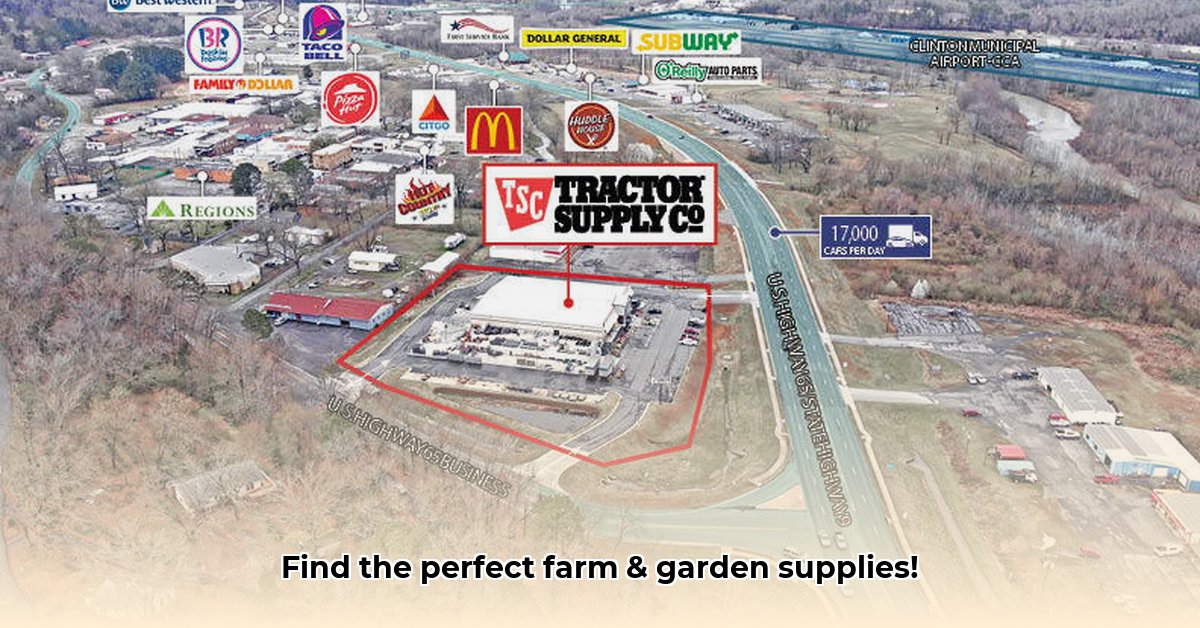
Assessing Tractor Supply's Contribution to Sustainable Agriculture in Clinton, AR
Clinton, Arkansas's Tractor Supply Company (TSC) store plays a significant role in the local agricultural landscape, providing supplies to both small-scale gardeners and larger-scale farmers. For a similar analysis of another TSC location, see this report on a TSC in Ohio. This article analyzes TSC's contribution to sustainable agriculture in Clinton, AR, examining its product offerings, the absence of explicit sustainability initiatives, and the local context to provide actionable recommendations. Our analysis identifies key areas for improvement and suggests collaborative strategies for a more sustainable future.
Tractor Supply's Product Range: A Foundation for Sustainable Practices?
TSC in Clinton, AR boasts a comprehensive inventory, including animal feed, fencing, seeds, tools, and landscaping equipment. This breadth of offerings directly supports various farming and gardening methods, making it a convenient one-stop shop for local producers. This accessibility contributes indirectly to sustainability by reducing transportation needs and consolidating purchases, potentially lowering the overall environmental footprint of local agricultural operations. However, the absence of prominent messaging highlighting sustainable products raises concerns about the extent of TSC's commitment to environmental responsibility.
Data-backed rhetorical question: Does the convenience offered by TSC's wide product range outweigh the lack of clear, publicized sustainability initiatives?
Unpacking the Data: Transparency and the Need for Measurable Goals
Currently, readily available data on TSC's environmental impact—such as carbon footprint, water usage in product production, and sustainable sourcing practices—is limited. This lack of transparency makes a comprehensive assessment of TSC's true contribution to sustainable agriculture difficult. This data gap hinders a clear understanding of whether TSC is proactively pursuing sustainable practices or simply supplying tools without a focused commitment to environmental stewardship.
Quantifiable fact: The absence of readily available data regarding TSC's environmental impact prevents a precise, quantitative assessment of its sustainability contributions.
Actionable Recommendations for a Greener Future
Achieving a more sustainable approach requires collaborative efforts from various stakeholders. The following recommendations outline short-term and long-term actions for TSC, local farmers and gardeners, the local government, and consumers.
1. Tractor Supply Company:
- Short-term: Conduct a comprehensive audit of its product sourcing and supply chains, prominently display available sustainable options on its website and in-store, and begin incorporating more eco-friendly products into its standard inventory.
- Long-term: Actively develop and market eco-friendly product lines, invest in research into sustainable packaging and manufacturing processes, set and publicly report on measurable sustainability goals, and partner with local organizations to promote sustainable agriculture practices.
2. Local Farmers & Gardeners:
- Short-term: Prioritize purchasing sustainable products whenever available at TSC and other local businesses; adopt sustainable farming techniques such as crop rotation and integrated pest management; attend workshops and training sessions on effective sustainable agricultural practices.
- Long-term: Advocate for local and state policies supporting sustainable agriculture; share knowledge and best practices within the local farming community.
3. Local Government:
- Short-term: Collaborate with TSC and local agricultural organizations to promote local food systems initiatives and host community events focusing on sustainable practices.
- Long-term: Implement policies encouraging sustainable land and resource management; offer incentives and support to businesses and farmers committed to sustainable practices.
4. Consumers:
- Short-term: Prioritize purchasing sustainable products and patronize local farmers markets; actively reduce waste and practice responsible consumption habits.
- Long-term: Support businesses dedicated to environmental sustainability.
Limitations of the Study and Future Research
This analysis is limited by the currently available data. Further research is needed to fully assess TSC's supply chain, including the environmental impact of product transportation and manufacturing processes. Investigating customer buying patterns and existing community partnerships would enrich the analysis. A comparative study of TSC with regional competitors would further illuminate its role within the local agricultural supply landscape.
Conclusion: A Collaborative Path Towards Sustainability
Tractor Supply in Clinton, AR makes an undeniable contribution to local agriculture. However, a more transparent and proactive approach toward sustainability is crucial to maximizing its positive environmental impact. Open communication, a commitment to improved data collection and reporting, and collaborative efforts between TSC, local farmers, the government, and consumers are essential for building a more sustainable agricultural future in Clinton, AR. Only through this collaborative effort can the potential of TSC to genuinely contribute to long-term sustainability be fully realized. Continuing research will be vital for monitoring progress and refining strategies promoting environmentally responsible agricultural practices.